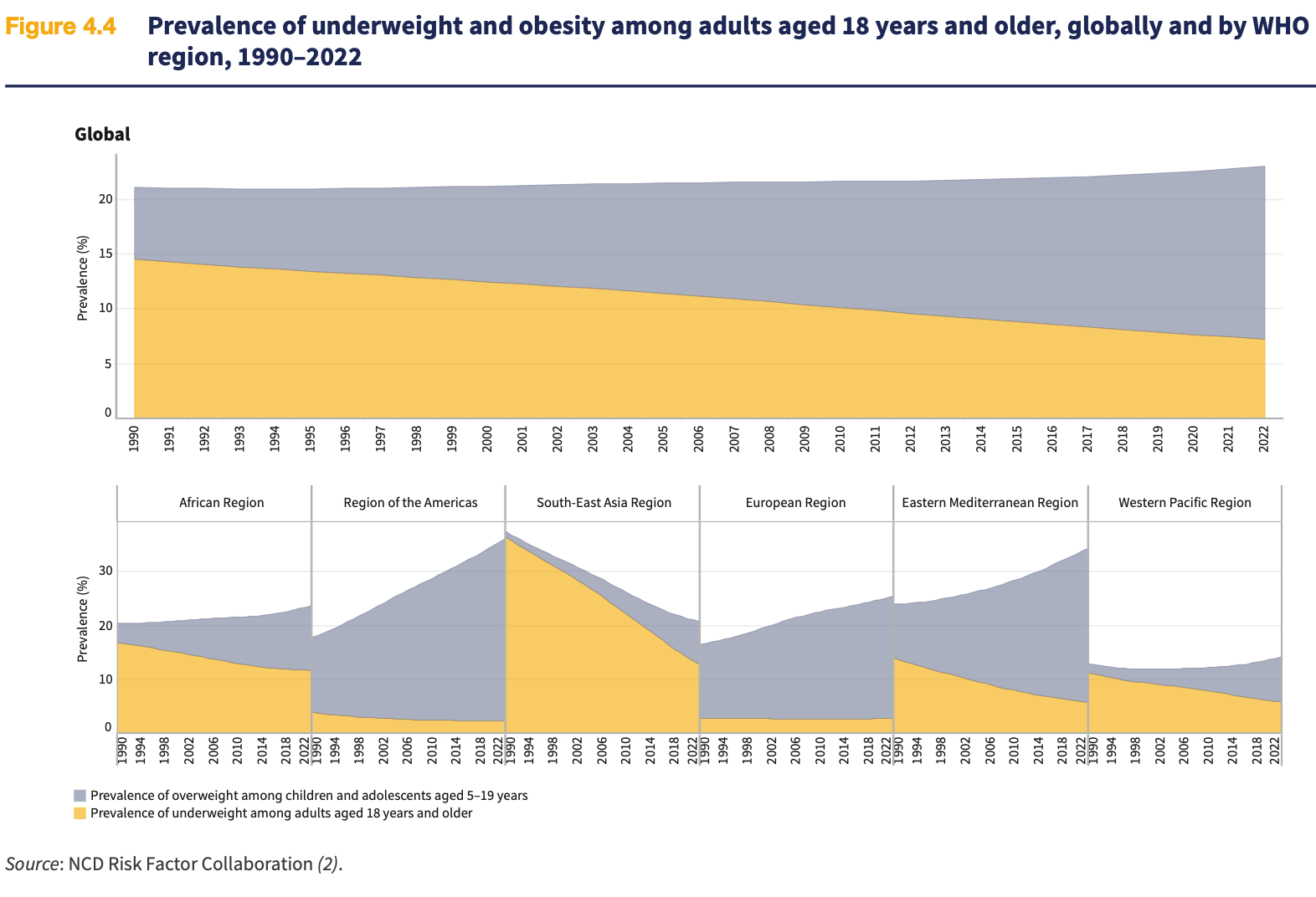By Charalampos Karouzos,
As 2024 draws to an end, it’s the time to reflect and acknowledge the inedible mark the year has left on global health in the realm of history. The steps taken this year extend further than groundbreaking medical advancements, which undoubtedly have been pivotal, engulfing the escalating public health crises, and the deepening ethical and ideological debates, which are actively re-shaping the way we understand and address healthcare today, the consequences of which remain to be seen in the future. This year’s developments, stemming from our decisions, underscore both the promise of innovation and the persistent challenges humanity is facing in achieving equitable health outcomes.
At first glance, 2024 has seen remarkable medical advancements that have the potential to redefine healthcare for generations to come. A transformative, and publicly praised development has been the widespread adoption of GLP-1 receptor agonists, such as Ozempic, Wegovy, and Mounjaro, drugs that although initially designed to treat type 2 diabetes, they have been proven to help patients manage obesity, once considered a difficult-to-treat condition. Although successful to their mission, reflected by the record profits for the producing pharmaceutical companies, the high cost and lack of access to those that need them, have reinflammed debates about health equity and the impact of financial interests in healthcare.

At the same time, 2024 also marked significant progress in vaccine development, with the approval of new vaccines for Respiratory Syncytial Virus (RSV) and malaria being a game-changer in the fight against these deadly diseases. The RSV vaccine, particularly vital for infants and the elderly, promises to reduce hospitalizations and deaths, which have been a major health burden for years. Similarly, the malaria vaccine has the potential to save millions of lives in regions where the disease is endemic, offering new hope to those most vulnerable to it. These developments highlight the continued importance of vaccines in improving global health and preventing infectious diseases.
Equally encouraging were breakthroughs in Alzheimer’s treatment, with two novel drugs that slow cognitive decline in patients, offering hope for millions of families affected by this devastating and common disease being approved, lecanemab and donanemab. Although not cures, these treatments represent a monumental step forward in managing Alzheimer’s, providing patients with the ability to retain their independence and quality of life for longer.
While medical innovation continues to transform lives, 2024 has also been a year marked by several step backwards in terms of quality of healthcare. Particulalry in conflict zones like Gaza, Syria, and Ukraine, the healthcare systems have been overwhelmed to say the least, with millions of people, particularly children, 1/6 children in the world, suffering from a lack of essential medical services. In Gaza, hospitals have been destroyed, healthcare workers are working under dire conditions, and children are facing a humanitarian crisis, with dangerously high rates of malnutrition and preventable diseases. The situation in Syria remains similarly grim, as years of conflict have decimated infrastructure, making it increasingly difficult to provide even basic care to the population. In fact, nearly 200 million children are living in the world’s most lethal war zones, the highest number in over a decade.
In Ukraine, the ongoing war has further disrupted access to healthcare, particularly for displaced persons and those living in conflict zones. The overwhelming need for care, combined with resource scarcity, continues to hinder effective treatment for the injured, as well as those battling chronic conditions exacerbated by the war. The health toll of these conflicts highlights the urgent need for international cooperation and humanitarian aid, but it also underscores the broader issue of health equity, where access to care is often a privilege rather than a right.

Additionally, antibiotic resistance and the rise of superbugs, an undercovered by the media issue, has become more pressing than ever. With the overuse and misuse of antibiotics across the globe, we are witnessing an alarming increase in infections that cannot be treated with existing drugs. In other words, novel multidrug-resistant “superbugs” are responsible for an increasing number of deaths and have the potential to turn routine surgeries into high-risk procedures. Despite the urgent need and hope for new antibiotics, the pipeline for new treatments remains underfunded and sluggish, serving as a stark reminder that, while new treatments are crucial, prevention and regulation are fundamental to protect the efficacy of existing drugs, and save lives.
Perhaps the most contentious issue of 2024 has been the deepening debates surrounding public health, misinformation, and the role of science in policy-making. A major focal point has been the potential appointment of Robert F. Kennedy Jr. as U.S. Health Secretary; a man known for his outspoken opposition to vaccines and his promotion of debunked theories linking vaccines to autism, with views that have been a source of concern for public health experts. His potential appointment has highlighted the dangers of allowing ideological beliefs to dictate health policy, particularly at a time when vaccines are essential in controlling preventable diseases, like measles and COVID-19. Kennedy’s stance has recently forced more than 75 Nobel laureates to formulate a collective call demanding a renewed commitment of the USA to evidence-based healthcare. Their message was clear: public health policies must be grounded in rigorous scientific research, not in misinformation or ideological beliefs. This public statement not only emphasized the importance of trust in science, but also directly challenged the rhetoric that threatens to undermine decades of progress in vaccination efforts.
Meanwhile, the rise of health misinformation has become a pressing issue, as the proliferation of false claims about vaccines, weight loss drugs, and other health topics online has fueled further distrust in medical institutions and public health recommendations. This misinformation, often spread through social media, has led to vaccine hesitancy, with deadly consequences. The year 2024 has seen governments, health organizations, and tech companies grappling with how to curb the spread of misinformation while respecting freedom of speech, an ethical dilemma that lies in balancing public health protection with individual freedoms.
The divide between scientific advancement and anti-science rhetoric has never been more evident, highlighting the urgent need for leadership that ensures scientific evidence drives health policy rather than misinformation or political agendas, especially as global health continues to evolve.
2024 has been a year of medical progress, but also a year of significant decline in the pursuit of a healthier, more equitable world. Groundbreaking medical innovations in obesity treatment, vaccines, and Alzheimer’s care offer hope, yet these advancements also demand that we address the underlying issues of access and equity. Escalating public health crises in conflict zones and the rise of superbugs remind us that global health cannot be isolated from broader societal issues, and health for all trascends countries’ borders. Meanwhile, deepening debates about science, misinformation, and the role of government in healthcare policies will continue to shape the future of public health, highligthing the need to imporve the education of the public to achieve our health goals. As we move to the major milestone of the 21st century, it is paramount that we not only strive for medical advnacements, but also ensure that the established goods can be accessed and distrubuted to all while at the same time promoting quality education to fuel the upcoming debates with evidence rather than ideology.
References
- UNICEF Geneva Palais briefing note – Gaza: The world’s most dangerous place to be a child. UNICEF. Available here
- 1 in 6 of the World’s Children Live in a Conflict Zone. Save the children. Available here
- Read the Letter From Nobel Laureates Urging That Mr. Kennedy Not Be Confirmed. The New York Times. Available here
- Health at a Glance: Europe 2024. OECD. Available here
- Health at a Glance: Europe 2024. Europa. Available here
- WHO. World health statistics 2024. World Health Organization. Switzerland. 2024.
- UNICEF. The State of the World’s Children 2024. UNICEF Innocenti – Global Office of Research and Foresight. Florence. 2024.
- Nobel laureates urge US Senate to reject Robert F Kennedy Jr’s nomination. The Guardian. Available here




